Blackjack Strategy Guide for 2026 – Charts & Tips to Get You Playing Like a Pro
Having a solid blackjack strategy makes it easier to know your next step in every outcome to ensure a better chance of winning your game. Basic blackjack strategy is easy to learn, even for beginners and doesn’t require you to use any special skills or have in-depth knowledge of specific types of play.
You can learn basic strategy for the game in under an hour and use it for playing online and in-person games. We offer you a simple blackjack strategy chart to get you started, examples of how to use this table, and top tips for getting it right.
Basic Strategy for Blackjack to Get You Started
Using the perfect strategy for blackjack is a quick and straightforward way to bring the house edge down to 0.5%. Blackjack or 21 is a game of chance and skill, so while you can’t control the cards you receive, you can use basic strategy in blackjack to make better decisions about what you do with those cards, which can affect how the round ends.
Using a basic blackjack strategy chart, you can easily choose the ideal action based on the cards you receive and the dealer’s upcard. While this blackjack strategy offers no guarantees because of the element of chance at play here, it does allow you to make the best play based on the cards on the table, which significantly boosts your chances of winning.
The blackjack chart for strategy is a method proven by mathematicians, so it has a sound basis. This chart, based on classic blackjack (although you can use it for single-hand games), shows you how to best play your hand for a successful outcome, making it ideal for new players and seasoned blackjack fans.
Blackjack Basic Strategy Chart
The following blackjack strategy sheet is a user-friendly tool you can implement when playing to help you easily navigate each hand. This blackjack strategy table makes it simple to know the best play for each set of cards you receive, taking the dealer’s upcard into account. It shows you whether to stand, hit, split, surrender, or double-down in every situation, so you can play blackjack like a pro, even if you’re new to the game. While this blackjack perfect strategy chart will certainly make things more straightforward, understanding the rules of blackjack is just as important.
| Your Hand | Dealer UpCard | |||||||||
| Hard | 2 | 3 | 4 | 5 | 6 | 7 | 8 | 9 | 10 | Ace |
| 5-8 | H | H | H | H | H | H | H | H | H | H |
| 9 | H | DD | DD | DD | DD | H | H | H | H | H |
| 10 | DD | DD | DD | DD | DD | DD | DD | DD | H | H |
| 11 | DD | DD | DD | DD | DD | DD | DD | DD | DD | DD |
| 12 | H | H | S | S | S | H | H | H | H | H |
| 13-16 | S | S | S | S | S | H | H | H | H | H |
| 17+ | S | S | S | S | S | S | S | S | S | S |
| Soft | ||||||||||
| 13 (Ace+2) | H | H | H | DD | DD | H | H | H | H | H |
| 14 (Ace+3) | H | H | H | DD | DD | H | H | H | H | H |
| 15 (Ace+4) | H | H | DD | DD | DD | H | H | H | Su | Su |
| 16 (Ace+5) | H | H | DD | DD | DD | H | H | Su | Su | Su |
| 17 (Ace+6) | H | DD | DD | DD | DD | H | H | H | H | H |
| 18 (Ace+7) | S or
DD |
S or
DD |
S or
DD |
S or
DD |
S or
DD |
S | S | H | H | H |
| 19 (Ace+8) | S | S | S | S | S or
DD |
S | S | S | S | S |
| 20 (Ace+9) | S | S | S | S | S | S | S | S | S | S |
| Pairs | ||||||||||
| Ace + Ace | SP | SP | SP | SP | SP | SP | SP | SP | SP | SP |
| 2 + 2 or 3+3 | SPD | SPD | SP | SP | SP | SP | H | H | H | H |
| 4+4 | H | H | H | SPD | SPD | H | H | H | H | H |
| 5+5 | DD | DD | DD | DD | DD | DD | DD | DD | H | H |
| 6+6 | SPD | SP | SP | SP | SP | H | H | H | H | H |
| 7+7 | SP | SP | SP | SP | SP | SP | H | H | H | H |
| 8+8 | SP | SP | SP | SP | SP | SP | SP | SP | SP | SP |
| 9+9 | SP | SP | SP | SP | SP | S | SP | SP | S | S |
| 10+10 | S | S | S | S | S | S | S | S | S | S |
| Legend | Description |
| H | Hit |
| S | Stand |
| DD | Double Down |
| Su | Surrender |
| SP | Split |
| SPD | Split only if doubling down after the split is possible; if not, opt to hit instead. |
Helpful Hint: If using a blackjack basic strategy chart isn’t for you, you can always use a blackjack strategy calculator instead. These online tools allow you to input the details of the hand, including your two hole cards and the dealer’s upcard. The calculator will then spit out the best possible move you can make.
Keep in mind, though, that the online blackjack strategy calculator and the chart above operate off the same principles, so your answer from the calculator will be the same as on the table above.
How to Use a Blackjack Strategy Chart
The blackjack strategy card follows the principles of probability. There are no guarantees when using this strategy or any other, but the statistical basis of this chart ensures on-target results.
The blackjack table strategy directs you on which action to take when playing your hand, no matter what cards you end up with. First, you must visit the best blackjack casinos and pick the game of 21 you want to play. Then, launch the game, select your chip, and place your bets. Next, you can hit “Deal.”
Once you have received your hand and the dealer’s upcard is visible, look at the cards you have. If you have an Ace, your hand is considered “soft” because the Ace can have two values, a one or an 11, depending on what works best with your other card. If you don’t have an Ace, your hand is called a “hard” hand. You have a pair if you have two cards of the same value, for example, 6♣ and 6♠.
Once you have checked out your hand, run your finger down the “My Hand” column to find your card combination on the blackjack basic strategy card.
Then, look at what card the dealer has as their upcard. Find this value along the top row of the chart. Move your fingers down that column and across the row for your hand value until they intersect. The instruction they meet on is the action most worth taking for a greater chance of winning.
Remember, this may not be the perfect blackjack strategy, but it comes pretty close and is a great way to boost your chances.
Examples of Using a Basic Blackjack Strategy Chart
Working through several examples is the best way to understand how to use a basic strategy blackjack chart. So, using top online casinos with exceptional blackjack offerings, we have produced several examples for you to review:
Blackjack Betting Strategy – Example One
In our first example of blackjack betting strategy, we received a queen and a five, giving us a total of hard 15. The dealer’s upcard is a four. According to our blackjack strategy guide or chart, we must stand.
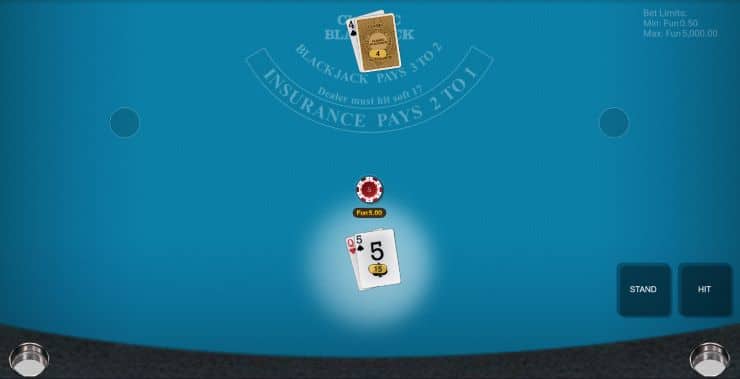
The dealer’s hole card was a three, so they hit and received a nine, giving them 16. The dealer hit again and received another nine, giving them a total of 25, which is a bust, leaving us the winner.
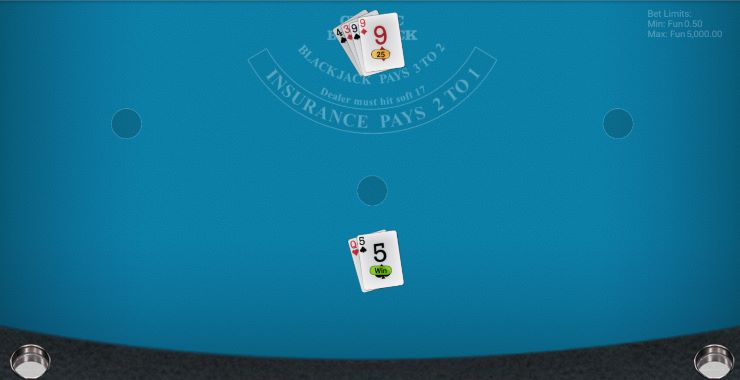
Blackjack Betting Strategy – Example Two
In this example, we received a king and a seven, giving us a hard total of 17. The dealer’s upcard is an Ace. The dealer asked if we wanted to take insurance, which we declined, as it is best to avoid side bets using a basic strategy for blackjack. We then checked out our blackjack strategy chart, which says we must stand.
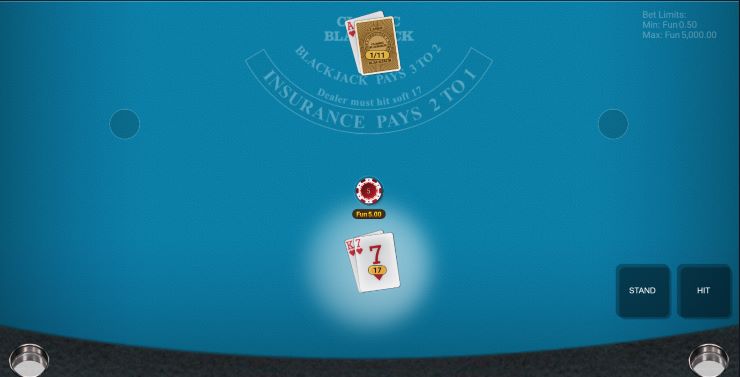
The dealer’s hole card was a four, so they hit and received another Ace. The dealer hit again and got a five (1+4+11+5 = 21), making it a win for them. So, you can see, this isn’t an exact science, and there is always room to lose a bet. As such, while this is an optimal blackjack betting strategy, it works well over a few bets but shouldn’t be relied on as a means of winning every time.
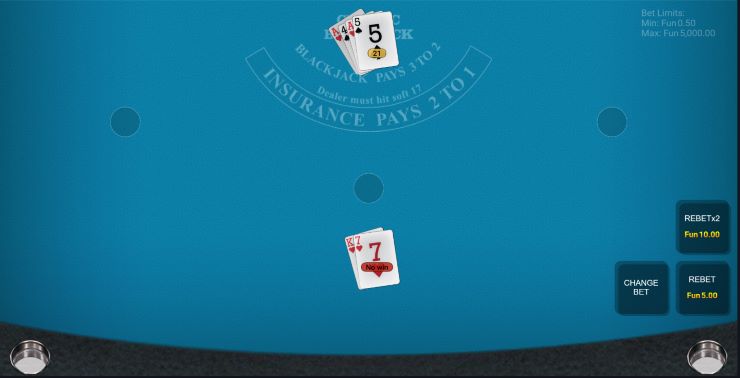
Blackjack Betting Strategy – Example Three
In our next round, we got an Ace and a two, giving us a total of soft 13 (with the Ace, our hand could also equal soft 3), while the dealer’s upcard is a two. Our blackjack strategy chart says we should hit for our next move.
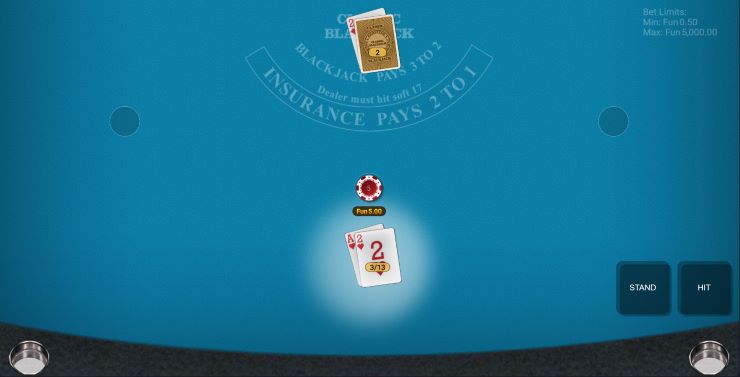
We received another Ace, giving us a new hand of soft 14. Again, our chart tells us to hit.
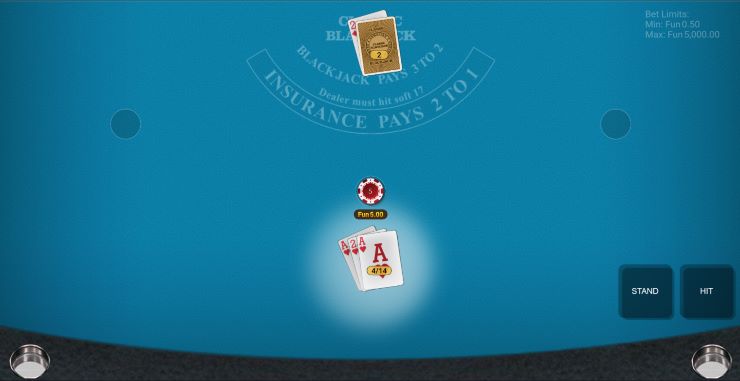
The next card we get is a five, giving us a soft 19. This time, our blackjack basic strategy table says we must stand.
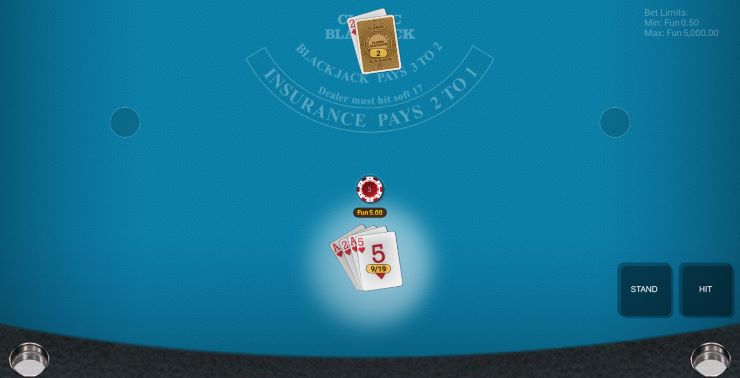
The dealer’s hole card was a ten, so they opted to hit and got an Ace, giving them a total of 13. Again, the dealer chose to hit and got a six, giving them a total of 19. Since we both ended up with a hand value of 19, the game was declared a push, as we received our initial stake back.
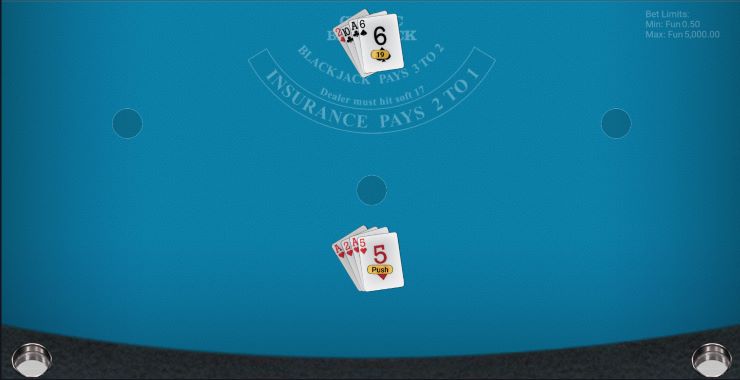
Blackjack Betting Strategy – Example Four
In a different round, the dealer got an upcard of eight, and we got a pair of two jacks, giving us a total of 20. According to our blackjack strategy chart, our next move should be to stand, which we did.
Now, the dealer gave us the option to split here, but remember, when working with pairs, never split if you receive two cards with a value of 10 each. A total of 20 is as close as you’ll come to 21, and a win, splitting these cards to get two separate hands, would, therefore be foolish.
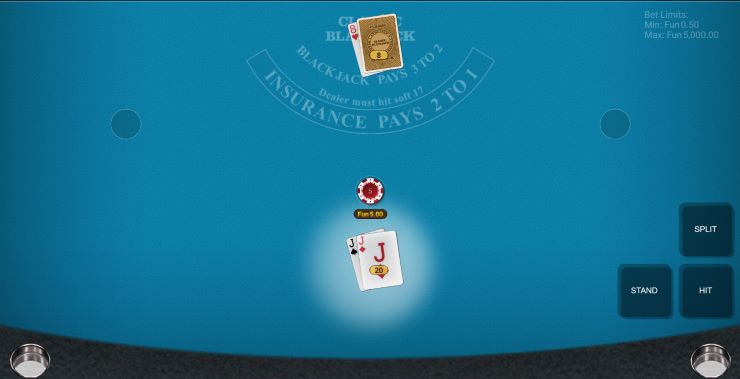
The dealer’s hole card was a four, giving them eight in total, so they chose to hit and received another four. Since their total was still below 17, the dealer hit again and got an Ace, leaving them with a 17, which means they must stand. As such, our 20 blew them out of the water, and we won the round.
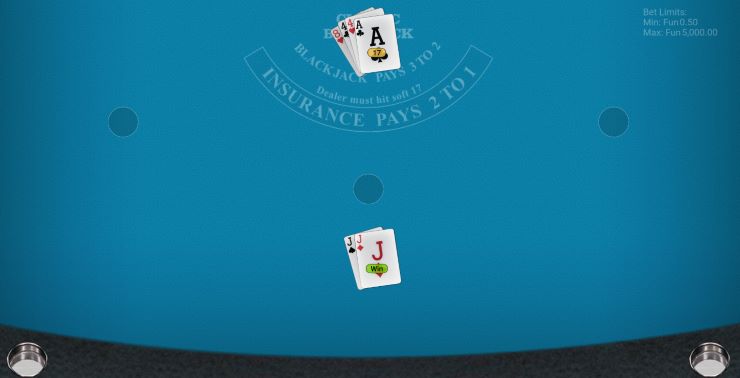
Blackjack Strategy – Using Surrender Strategy
Several blackjack variants offer surrender as an action that you can play in the game. By surrendering, you give up your hand in exchange for half of your original stake back. While this may seem counterproductive, it is the ideal strategic choice when you have a poor hand that offers a minimal chance of winning.
You’ll find two types of surrender blackjack strategies:
- Early Surrender—Here, you surrender your cards before the dealer checks their hole card. This is a rare offering as it significantly lowers the house edge (0.6%).
- Late Surrender—In blackjack, late surrender allows you to surrender your hand once the dealer has checked their hole card. If the dealer ends up with 21 (blackjack), you won’t have the option to surrender, and you’ll lose the round. Notably, this option is more common as it favours the house.
So when is it best to use the surrender blackjack strategy?
Only a handful of instances require the surrender tactic. First, surrender is the best option if the dealer’s upcard is an Ace, 9, or 10 and your hand is a hard 16. The other time is when the dealer has an upcard of 10, and your hand is a hard 15.
When is it Best to Use a Blackjack Strategy Chart
It would be fantastic if this were the top blackjack strategy for all game variations. However, there are some instances and conditions under which this strategy works best. Let’s see what they are:
- Dealer Required to Stand on Soft 17—Games where the dealer can hit on soft 17 (when they have an Ace) work to the house’s advantage, but games that require a dealer to stand on 17, work better for the player.
- Double Down After Splitting Permitted—If you double down after splitting, you can bring down the house edge by 0.13%, which means a better payout. If your blackjack game allows you to do this, there are several instances where this is a better option than straight hitting.
- No Limits on Doubling Down—You can use the blackjack basic strategy chart to its full potential when the game doesn’t impose any restrictions on doubling down, which means you can play freely without hassle.
- Offers Resplitting—Although rare, some top payout casinos may allow you to split again after your first split (resplitting), giving you four hands to play instead of just two. This increased number of hands gives you even more chances to win blackjack.
- Blackjack Perfect Strategy Odds of 3:2—If you land an Ace and a 10, the game will pay you odds of 3:2. While odds of 6:5 look higher, they’re not, and you pay a higher house edge. Stick with odds of 3:2.
Top Tips for Using A Basic Blackjack Strategy Chart
You can achieve the best blackjack odds with the perfect strategy by bringing down the house edge. To do this, you must use your blackjack strategy chart or table, and you can combine this with the top tips below for even greater chances of winning.
Practice Your Blackjack Strategy in Free-Play Mode
The best way to understand how this blackjack strategy works and become used to it is by practicing. You can practice for free online at casino sites offering blackjack games in demo mode. These games allow you to play using virtual coins and become acquainted with your blackjack winning strategy without risking deposited funds.
Check the Blackjack Rules of Your Game Before Starting
Before you begin playing a blackjack game, always check the rules for that particular game. Doing this makes it easier to know whether it is a good fit for using your blackjack strategy and whether you will need to make allowances in some instances.
For example, check the rules that apply to the dealer and whether they’re required to stand on 17 or not and what a soft 18 means, or if you’re allowed to double down after splitting.
Get to Know the Most Common Actions
There are several more frequently used actions when using the basic strategy for blackjack, such as standing on hard 17 or splitting when you have pairs, except if you have two cards, each with the value of 10. Always splitting a pair of 8s is another standard action. Knowing these will help make your game much quicker and easier without you having to memorise the entire blackjack strategy chart.
Bet In Small Amounts
Pick small betting units, particularly if you’re still practicing your blackjack strategy. Using smaller betting units like £1 up to £5 makes it easier when you suffer a loss and it will extend your bankroll, allowing you to play blackjack for longer.
Always Use Your Basic Strategy Blackjack Chart
It helps to use your blackjack basic strategy chart each time you need to perform an action. This may mean using your strategy table several times in one round. The chart is designed based on mathematical probability, which means the actions provided on the table give you a higher chance of winning or having the hand result in a push.
Gamble Responsibly
It is always best to practice responsible gambling to enjoy the game and blackjack perfect strategy odds. Gambling responsibly may include setting a budget, limiting the time and funds you spend at the online casino, or even reaching out to a top problem gambling resource like GamCare if you need to.
Implementing Advanced Blackjack Strategy
When you are comfortable using basic blackjack strategy, you may want to try an advanced blackjack strategy or two. These more intensive options can be used for several blackjack variations, which may make them a better choice where basic strategy doesn’t apply. Let’s look at a few more advanced strategies for blackjack players.
Single Deck Blackjack Strategy
Classic blackjack uses six to eight decks of 52 cards each, whereas single deck blackjack uses only one. In addition to being a much faster game, the odds differ significantly and require you to alter your blackjack strategy.
So, what is included in single deck blackjack strategy?
Your chances of receiving a card worth 10 points are much higher, so you’ll always need to double down on 11. If the dealer lands a four as an upcard and you have a 12, make sure you stand, as there is a good chance the dealer may bust. Always split eights and Aces, as you’re more likely to end up with two strong hands.
Card Counting
If you’re a novice player or playing online 21, we recommend skipping this blackjack strategy altogether. It is an incredibly challenging strategy that requires careful concentration and is void when playing online games.
Card counting is a strategy that requires you to closely follow the cards to determine the ratio of 10s, Aces, and face cards to smaller value cards (2, 3, 4, 5, and 6). Pro bettors increase their bets when the shoe has many high-value cards, as they’re more likely to receive a stronger hand.
While many retail and online casinos allow card counting, it requires careful concentration, tracking, and memory of the cards used. For this reason, card counting is easier to implement in single deck blackjack games.
Martingale Strategy
Players use the Martingale Strategy for several table games, including blackjack. This strategy outlines that you begin by choosing a betting unit, say £1, and then each time you lose, you double your betting unit until you win. When you win, you return your bet to the original betting unit.
The idea behind this blackjack strategy is that by doubling your bet with each loss, when you win, you’ll recoup all of your losses and turn a small profit. However, it is important to keep in mind that this strategy can be brutal on your bankroll management, particularly if you set your starting betting unit high.
Blackjack Strategy for Side Bets
Blackjack strategy doesn’t apply to side bets, as these wagers don’t focus on the outcome of the round but rather on other things that happen within the game. Side bets like 21+3, insurance bets, and perfect pairs are all based purely on luck, and no amount of strategising will change the outcome here.
The higher odds given for side bets should clearly indicate that they are harder to win and should be placed sparingly.
